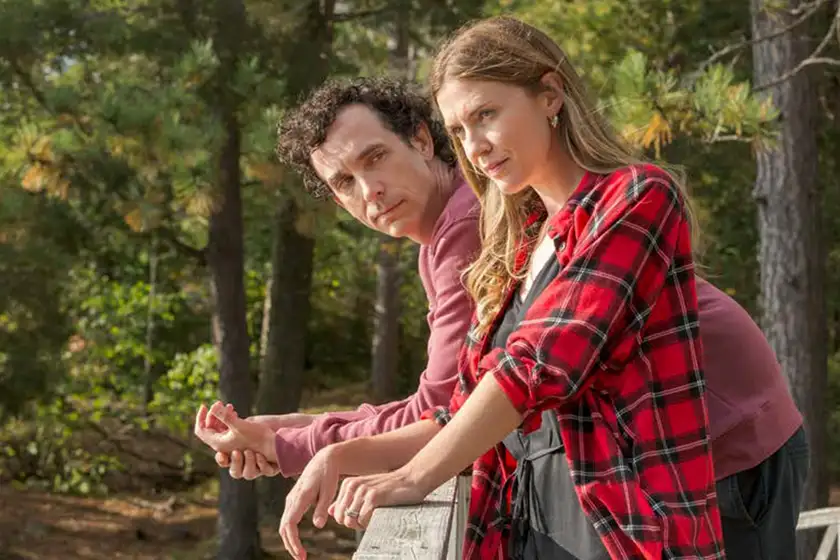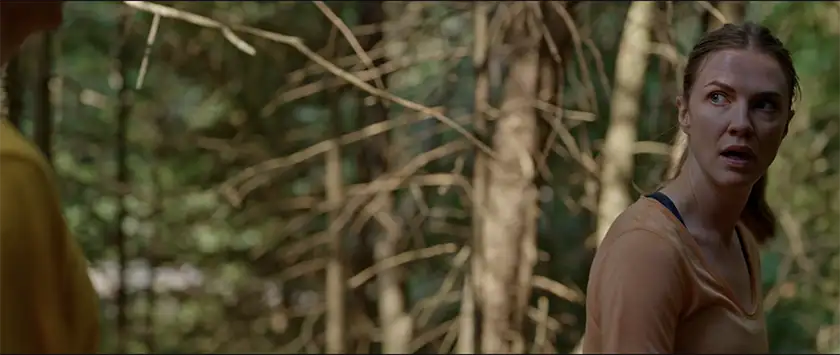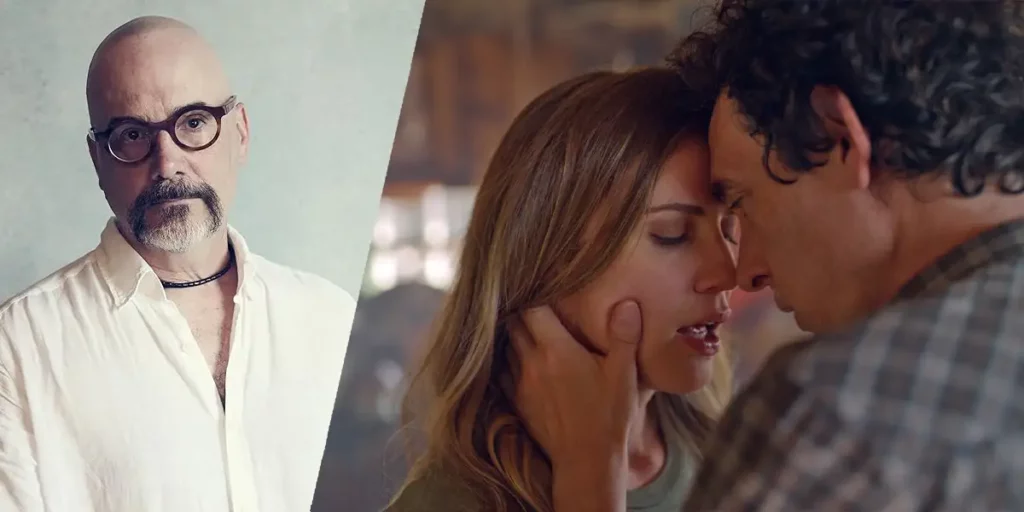We interview Sean Garrity, director of inverted romance The Burning Season, along with stars Sara Canning, Jonas Chernick and Christian Meer.
Sean Garrity’s The Burning Season is a romance that is structured into a prologue and seven chronologically descending chapters. It charts the tale of lovers Benny (Christian Meer as a teen, with Jonas Chernick playing the role as an adult) and Alena (Sara Canning) from their explosive finale to their naive beginnings as children at a campsite. The Burning Season played at Glasgow Film Festival in 2024, and we caught up with the director and cast of the entertaining, brisk film – as our review calls it – for an interview.
ON THE BURNING SEASON’S STORY BEING TOLD BACKWARDS
You tell the story of The Burning Season backwards. What made you choose this?
Sean Garrity: When I got asked to direct the film, to a certain extent, I was terrified. As a storyteller, and when I’m making a movie as the director, I’m talking to an audience and giving them a story. So I’m talking to them and telling them that this happens, then this happens next. That’s the engine that makes it go. But for this film, I was asked to throw that out the window and ask the audience to interact with it in a completely different way.
It’s more something like Peppermint Candy, or Gaspar Noé’s Irreversible, where you meet the characters in crisis and hopefully ask, “how did they get there?”. That kind of thinking leads the structure so then it’s how did they get there so you’re watching them make choices. Unlike a normal film where a reckless, cool choice is made and the consequences are seen later, this is asking you to evaluate it in a different way. We’re asking the audience to take a slightly more cognitive approach.
Jonas Chernick: We were very conscious that, because we were going backwards, we were not going to hook the audience in the same way as always. It wasn’t going to work for this one. We had to recontextualise not just the central relationship but the peripheral relationships as well, and try to have the audience see them in a new way every chapter. Say you see the character of Poppy at the wedding, then, as you go through the subsequent chapters, you’ll go “oh, there’s more to that character”.
It’s an approach that I think provides depth as we go. And when I’m watching the movie, I relish the moment where we are in the prologue – well, what we call the prologue at the end of the movie – where you’ve been with the adult characters for so long. Even though I know it’s happening, because I wrote it, I’m leaning forward to finally put all the pieces together. Seeing it with an audience for the first time at the premiere in Canada, it’s a joy as the writer of the film, to see the audience lean forward at that moment. And suddenly, the film breathes this new kind of life. You inhale as they kind of know that they’re now going to see what the origin of this mess was.
You’re right. It was unconventional and a risky choice. We were highly aware of the narrative challenges in telling the story, because Shawn and I have made many films together, and we work extremely hard on our scripts. We’re conventional storytellers, and it’s very important to us that one event and one choice leads to the next, and leads to the next. Things become increasingly complicated as you’re leaning forward and trying to assess where it’s going to go. So we were excited to kind of flip that on its head. Shaun said he was terrified, and I think we all were to some degree, in trying to tell the story this way.

ON SHOOTING THE BURNING SEASON LINEARLY AND PLOT STRUCTURE
So did you shoot The Burning Season linearly, then go back?
Sean Garrity: Yes, from Chapter one to Chapter two, and so on.
Did you ever make an edit of the film linearly?
S.G.: Where it goes forward? No, I don’t think we ever did, even though we talked about it. The original cut was much longer, as all films are. There is half an hour to 45 minutes of this movie that the world never sees. We really wanted to focus on the pacing of it, and give the audience just as much as they needed, but hopefully leave them with some questions before we kind of went on to the next chapter. So there’s a lot of very enthusiastic snipping that happened, especially in the middle, to keep that pace.
Jonas Chernick: We were very careful about the plotting and where we drop a bread crumb, and when that bread crumb gets picked up. The idea, hopefully, is that there’s the right balance of something that is introduced in a scene, or an idea, or a reference that doesn’t quite land, and you don’t quite know what it means, but you know that there’s something behind it – an inside joke, a reference to something. And then, in a subsequent chapter, as we move back in time, insight is handed out to the audience, but you don’t want to do that too much. Because I think that can be cloying, and I thank Shawn for pulling me back in many cases. We called it the parlor trick and if you do that too much, I think it can be irritating.
S.G: There is a sense that we wanted to create this kind of shape, this mystery at the centre of the story. The further you go, you realise, “wait a minute: there is something sort of there.” I also had this idea of using this fire, which is on the poster earlier, and having it very present all the way through the preceding chapters, to give a sense that we’re heading to something.
ON CHOOSING SEVEN CHAPTERS FOR THE BURNING SEASON
So why did you choose to do The Burning Season in seven chapters?
Jonas Chernick: The seven was arbitrary. My writing partner Diana (Frances) and I didn’t set out to do seven chapters. It was really a matter of how many chapters we needed to tell the story. I wrote it chronologically and then flipped it. It was six at some points, then it was nine, and ultimately seven, through rewriting. When Shawn came onto the process he had incredibly strong opinions about how the script needed to change. So the big finale, the event that occurs at the end of the movie that recontextualizes everything, was Sean’s brainchild. There was something far more subtle going on when Sarah read the script and auditioned. This big event was not in the script at all when Shawn came on.We came up with that ending when we kind of rewrote the script, but I’m not sure if we had more or less chapters at that point.
Sean Garrity: There’s something about the number seven that makes you think mythologically, and what makes it the more interesting number than eight. Seven is better than eight or six.
Christian Meer: Seven is actually my favourite number.
J.C: Is it really? Well there you go, that’s why we did it.
ON SEAN GARRITY COMING IN TO DIRECT THE BURNING SEASON LATE
You said that Sean came in late, how late is late?
Sean Garrity: I was finishing another film called The End of Sex, which was here [in Glasgow] last year. I was in post on that movie and Jonas came and said, “I’m in this situation, and we’re in the market for a director for a film that is essentially going to camera in a few weeks.” So we had that conversation and then I would be leaping into prep on this one.
Was there ever a time where you thought you might direct it, Jonas?
Jonas Chernick: No, never, I’m not a director. I had been collaborating with another director who was an executive producer on the film. His name was Fab Filippo. We developed the script for him to direct for years, and then, just weeks before we were going to roll camera, we had to switch up and get a different director. Fab had another project that had gone late because it had had some COVID delays, and he had to finish it. We needed to bring in another director, and coming in so late in the game, I declared there was literally only one person in the world that I would feel comfortable bringing on this late in the game, and that I trusted.
The trust is a massive piece, because I was going to cancel the movie and give everyone their money back if Shawn wasn’t available or couldn’t do it. We’ve made seven films together, we have a history and we’re very good friends. He was the only one for me, but I knew if he were to come on he’d say, “I’ll take it, but your script…” How did I know that? Because several years ago I’d given him the script as a “hey, can you read this, and let me know what you think?”. He read it but he was like, “it’s great, but you’re missing your ending: you don’t have your ending yet. You don’t have the event that created all of this.” And he had tossed a couple of ideas at me – terrible ideas! – but I knew, when I came back to him, that that would be the end. Thank God, because you know, the whole movie, for me, lives and breathes in that ending, and builds up to that. As soon as he came on board, we started casting, first thing.
ON CASTING
How did you come aboard the project, Christian?
Christian Meer: It was a normal casting process. Like it’s normal now, since we’re past COVID. I sent a self tape and then did an in-person call back.
Sara Canning: That is not normal, which is exciting. You don’t get an in person call back often!
C.M.: Oh well, most of my callbacks have been in person. This is my first film, so I didn’t have any experience up into this, and it was an amazing experience. But as far as casting goes, I think I think it was normal.
Jonas Chernick: But he’s being humble. Can I quickly brag? So Christian, he did our film. It was his first film. He’s brilliant in it. And then, immediately after, he was cast as the fourth lead in a massive film with Riz Ahmed and Jessie Buckley and Jeremy Alan White, called Fingernails. And Christian is fourth or fifth on the call sheet, with those giant stars. He’s brilliant and he crushed the performance in that movie. We were lucky to catch him right before he ascends to mega stardom.
Sean Garrity: You can still get him on the phone!
C.M: Actually, that film only happened because of this film, so thank you.
Sara, how about you?
S.C: I did a chemistry workshop on Zoom, not in person. I was in Vancouver; these fellas were all over Canada, and it was a great time. I can’t really remember a lot about it, and that’s usually the sign of “Oh, that was a great time.” And I think, speaking to what you guys have been talking about with the script, I had read a different draft of the script that I was very excited to be brought on board with. And then I was excited and shocked when I read about the event and I thought, wow, okay, that’s saying something for sure. But I think, for me, I was so taken with the script. Sometimes I actually don’t need an event and I’m so happy it’s in the script, but I was still really enthralled with these characters.
And I was like, we can go backwards, forwards, sideways, we can skip 50 years, I don’t really care. I am really interested in what happened to these people. And I’m always going, “why are these people behaving in this way? Like, why?”. I love a slow burn and I’d watch one for six weeks. I don’t think this film is a slow burn at all but I was like there’s something here that I would just love to explore with a great scene partner and Jonas is an incredible scene partner, and so are Joe [Pingue, who plays Tom] and Tanisha [Thammavongsa, who plays Poppy]. And I hope that we actually get to work together in a scene one day, Christian. We have just such a fine group of actors in this film, and I love what happened with the script. But I was so on board to just go to camp with these people one summer and figure out what the hell is wrong with them? I was so thrilled to do that.
SEAN GARRITY ON THE LOCATION AND USING DRONES
Can you tell me more about shooting in this camp?
Sean Garrity: It was a summer camp that we made look like a rental cabin property. But it was actually a summer camp for rich kids. Previous rich kids at the Summer Camp include Justin Trudeau, when he was a kid. When the summer actually finished, and there were no more kids because they were back in school, the camp kind of stayed open for another month for us. But on all the weekends, they had all sorts of activities, so we had to be gone.
Oh so you lost 2 days out of every week you had to shoot there?
S.G: I think this was four weeks. You’re in prep for three weeks, then you’re shooting for three weeks minimum. Four weeks here. It’s basically a season, and in Canada, summer is very, very short. But yeah, we’d have our sound guy saying, “I can hear 1000 people in the background,” and we would have to work around that. We had rapidly changing leaf colour in the background that we had to sort of deal with as we shot in Canada, and when summer’s over man, it’s over.

Christian Meer: One of my favourite parts of the film are those shots of the park.
S.G: Yeah, the drone shots. They were done by a second production team. I told Eric [Oh], our cinematographer, that I wanted a bunch of drone photography. We were trying to work out a package to afford it, and he had his guys that he was trying to make us a deal with. And if the deal would work out, we wouldn’t have to hire a drone guy. So he was like, “I’ve got a drone, and I’m learning how to use it.” Every morning before we went to set, and some days after we wrapped, he and I would just practice using his drone. He’d get it up and we’d fly around and I’d say, go that way, and maybe do this, and do that. So we actually have hours of drone footage.
Jonas Chernick: I mean, it’s the most remote location I’ve ever shot in. We were so far away from resources and supplies that it posed a number of production challenges. It made me want to retire from producing. We got really lucky when very few movies get to film up there.
S.G: Yeah, and no drones allowed!
J.C: Yeah, the drone shots were done elsewhere… What did we call them on set?
S.G: Vertical dollies, I think. Eric had some stupid word for them because we weren’t allowed to – oh my god, do you remember the park ranger? When I had to send away the drone?
J.C.: Way up into space! Yeah, we have space footage.
S.G: It was when you guys were running and we were following you with the drone, and then all of a sudden, a park ranger appeared.
C.M: I hope you don’t retire from producing!
S.G: We all hope that: Jonas is Canada’s finest producer.
J.C: Thanks, fellas!
Thank you so much, guys!
This interview was edited for length and clarity.
The Burning Season was screened at the Glasgow Film Festival on 3-4 March 2024. Read our Glasgow Film Festival reviews!

